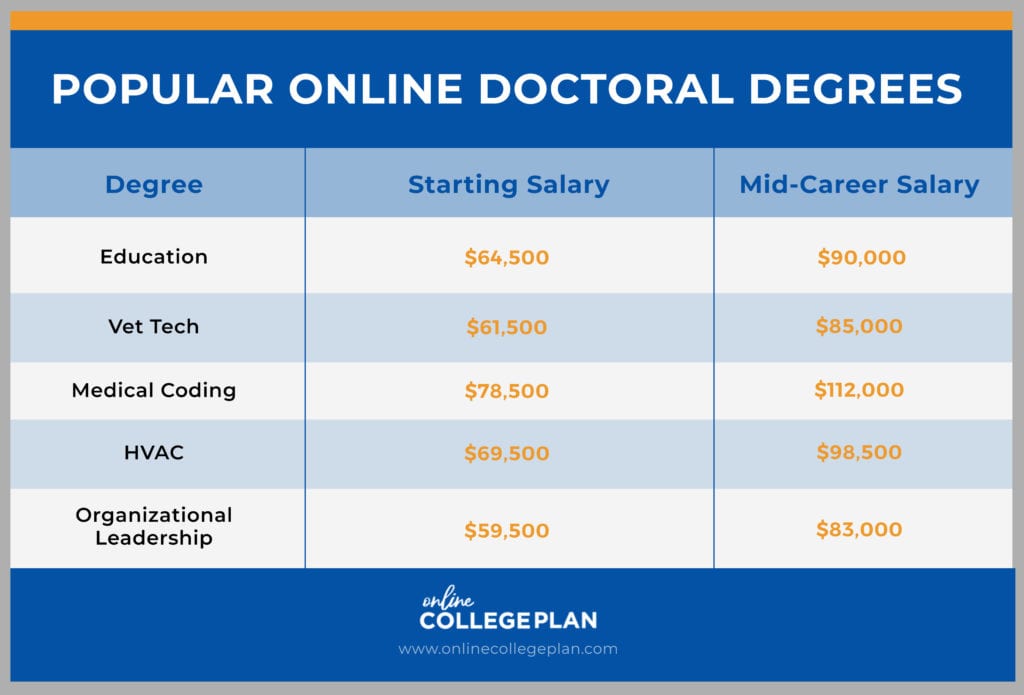What is a Doctorate Degree?
Find your degree

Are you wondering about the different types of doctoral degrees? Confused about the differences between a doctorate and a PhD? This article explores the answers to this common question.
Is a PhD and a doctorate the same thing?
Not all doctorates are doctors of philosophy (PhDs). There are also doctors of education (EdD), doctors of business administration (DBA), doctors of fine arts (DFA), and of course, the ever-popular doctor of medicine (MD). All of those degrees (and substantially more) are considered doctorates. Each implies a level of authority in a field where you can be a representative and/or organizational expert. Each graduate at the doctoral level has earned the right to be referred to as doctor and as a bonus, can dawn those rad velvet shoulder stripes and sashes in a special color denoting your discipline (music majors get hot pink, social work uses the somewhat rare color of citron and the field of economics is signified by copper, for example) on your graduation robes. Doctoral graduates also wear a beret with a gold tassel at graduation, as a visible payoff for years of hard work. If one utilizes their degree to teach or is invited to speak at a graduation, they will be entitled to wear these robes again.
See Also: Online Doctorate Degree and PhD Programs
What is considered a doctoral degree?
A doctoral degree is one that prepares an individual to teach in their field at the postsecondary level or prepares an individual to research exhaustively or write professionally on their topic. A doctorate is the result of multiple years of hard work and rigorous coursework, in some cases as few as four, in some, as many as eight years of study. Two main types of doctoral degrees include the doctor of philosophy–which is a research-focused degree, and the professional/clinical doctorate, which requires practical experience to enter and tends toward industrial application and leadership. Typically a defense of an extended written document, often book-length, is required of doctoral students.
A number of degrees can be combined; a number of degrees can be completed faster that way, in an MA/Ph.D. program, for instance, but the combinations depend on the subjects and institutions that interest you and the faculty available and appropriate for your particular areas of eventual expertise.
Before the afore-mentioned defense, some testing is also necessary, which can include comprehensive subject exams that can be written or oral. Before even this, one will likely have a review of the research. And one is expected to supply a preliminary piece of writing that you submit to a committee to approve of the topic. This review process is conducted by those publishing research and/or conducting studies, typically as a select group that themselves have survived the process.
If one defends a book-length critical work of scholarship (or creative work, or an applied science project), they will be expected to produce a level of work similar to possible future colleagues. This level of professionalism is pretty rare and unlikely, especially due to the rigors of the study-work-life balance. Ask those who know you well enough to answer: can you pull this thing off?
Does a doctorate make you a doctor?
In some ways, yes. However, not a medical doctor, which is the name for an MD. One can have a Ph.D. and an MD, of course. Frankly, the great investment of the Ph.D. degree makes it socially acceptable to call yourself “Dr. XYZ,” but it also depends on the context. Medical doctors are called doctors under just about all circumstances due to their immediate public obligations and skills. When “is there a doctor in the house?” is called out on an airplane, this is the time to keep your extemporaneous lecture on the winsome themes of Beethoven’s Eroica Symphony to yourself.

Are there degrees higher than a doctorate degree?
Not exactly — one can obtain additional degrees or combined degrees, such as the MD-PhD, but one cannot get a degree at a level higher than the doctorate. Postdoctoral research does exist in the applied sciences. These opportunities are for students to obtain more experience, further their research, expand their training, and work with academic peers before entering the job market for academics, research, or really any field. They are often subsidized (hence the fellowship that is often part of the name of these programs) and lend the student credibility and authority to their work through the prestige of the program, which might be hard to access for a freshly minted Ph.D. working at a low-level position. Not to mention equipment and other resources that can truly make or break a project.
What types of careers are available to those with a doctorate degree?
Typically with a Ph.D., you will be prepared for leadership and/or professorial positions. Obviously, going through a program produces more than a point on one’s curriculum vitae. By providing original research for an industry, for example, one adds credibility and experience to their CV. Many students choose to leave their program after their coursework has been completed but before graduation, which is known as ABD (all but dissertation). While this can seem like a waste, the lengthiness of the process can lead to all kinds of unplanned changes in circumstances. It is important to examine the career field and its support for those completing graduate work. There are still career opportunities for those with the expanse of knowledge that an ABD implies.
What are the admission requirements for a doctoral degree?
For research-focused degrees, a bachelor’s degree and test scores ranging from GMAT to MCAT are required. For professional/applied degrees, the expectation is that you have spent significant time in the private sector or in related apprenticeships or internships. Most schools have a fairly rigorous and conventional application-acceptance process, which means you have to have all your materials turned in well ahead of deadlines. Obviously, you need to organize yourself well enough to keep track of where you have applied and other crucial dates. Most schools have thorough sources online, including checklists and key contact information. In fact, most of the application process can be completed in the online realm. As you progress through the admissions process, the committee may want to speak with your references, and, eventually, with you. The admissions process for on-campus programs and online programs is usually identical or at least very similar, as the committee reviewing applicants is usually the same for both programs.

How much does it cost to obtain a doctorate degree?
Though not a universal truth, the tendency is that the higher the degree, the greater the tuition cost. Some things that are changing in the industry include the wider acceptance of online, typically less expensive, academic work. This may have a positive effect on tuition overall. At least until tuition is eliminated, which could be a while. Typically, out-of-staters will pay over $65000 a year for medical schools while other doctorates still run well over $35,000 yearly.
Because of the challenges of completing such degrees in a timely manner, loads of scholarships, grants, and related funding options are widely advertised within programs and other resources. On-campus programs also offer graduate teaching assistantships which can subsidize the experience considerably, providing tuition waivers and a stipend for living expenses.
You must have an idea of what grants would be most appropriate–you must know what area you likely are entering. Nursing, engineering, and sciences tend to provide the most options, especially if you happen to be a student of need or cultural disadvantage, such as those who are exiting a foster care system.
You will also be best served by digging into whatever testing or other standards of entry for doctoral programs most likely apply to you. The sooner you know you need to take or improve your MCAT score, the better.
Additional options include religious or cultural backgrounds that have special advocates. Some expect you to maintain a certain level of performance, though not all.
Is obtaining a doctorate degree worthwhile?
Commonly, to be frank, students can feel as if the choice they have made was not the one meant for their best welfare. With such an exhaustive level of labor that goes into the production of the degree, you would be best advised to think hard about what you will be doing with that diploma. Also, after speaking to someone with the experience of a “dissertation widow” to get another perspective, that the time you put into the degree cannot be returned–not just your own time, but that of those around you that you care about.
While it is most likely that you will have to relocate to study what you really want, you may have an opportunity to spend significant years in a college town where you will certainly be a busy person, but speaking anecdotally, not a few people consider graduate school the most significant time in their lives. Which is all the more reason to be as thoughtful as possible in your research. If you are lucky enough to have a favorite professor in your field, take advantage of this, especially if that person can be frank about the future they symbolize to you.
Similarly, you will likely spend enough time doing this that you will have to keep up with your peers and colleagues as new technologies and world events change how we teach and learn. You will benefit from a balance of theoretical as well as practical-minded advice.
That said, you will likely gain a new series of friends and colleagues you may only have had a chance to get to know through the rigors of this process. The conventional drop-out rate is about half of all candidates, particularly in the US, where the process is significantly longer for most doctorates compared with European schools.
Before you even go through the degree, the application process has become ever more competitive and professionalized. A recent trend is application coaching, which aids students in navigating the process more professionally.

Will obtaining a doctorate degree help to advance one’s career?
With the right choice, definitely. That said, the choice takes some care and advice from documents such as this one as well as mentors you’ve had. Do the research on your particular market via the Bureau of Labor Statistics and others. As noted above, you will be served best by doctorates that have value in the current markets. Notable recent trends include:
- the ever-present sciences and engineering
- nursing
- healthcare
- academic administration
As the profile of online study grows among the population, and its stigma diminishes, getting a degree online may be a realistic way to fit it into your life. This allows you to pursue your highest level of education while maintaining your personal and professional responsibilities (and also maintaining those key mid-career retirement contributions). If you are capable of pursuing education at the doctoral level, the obstacle presented by the technological and personal motivation aspect should be nominal.
What are the most popular doctoral degrees?
Law, pharmacy, and physical therapy are very popular doctoral programs that can be entered into without a master’s degree in many cases. Other popular doctoral degrees include accounting and finance, business administration, and clinical psychology. Science-based PhDs, like statistics, physics, and computer science are some of the most in-demand degrees.

How much can I make with a doctoral degree?
Salaries will, of course, vary wildly by field, but a holder of a Ph.D. who teaches on the tenure track at a large public university can expect to be remunerated in the mid to high five figures, with room for growth as that individual goes further through the tenure system. STEM PhDs report the highest salary, with opening figures in the low 100 thousand range.
In conclusion, a doctorate is the capstone of the education of a lifetime, but the key is to always remain open to the skills regarding learning itself that this process will teach you. Critical thinking and the lesson that you are never done learning, are key among those lessons. The doctorate program is not for everyone, but for those select few, it is the right decision at (hopefully) the right time. I mean, there is never a “good” time, to take 5-7 years out of your career to devote yourself to school and write a book and all the other minutiae that this program calls for, but with grace and determination, the process can be mastered, skills can be honed, and careers can be burnished (or launched).
